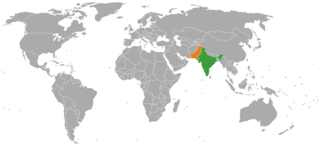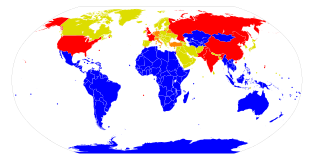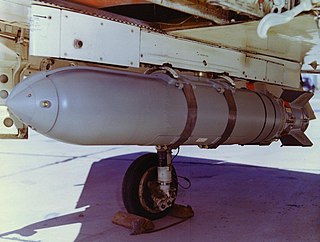
The Treaty on the Non-Proliferation of Nuclear Weapons, commonly known as the Non-Proliferation Treaty or NPT, is an international treaty whose objective is to prevent the spread of nuclear weapons and weapons technology, to promote cooperation in the peaceful uses of nuclear energy, and to further the goal of achieving nuclear disarmament and general and complete disarmament. Between 1965 and 1968, the treaty was negotiated by the Eighteen Nation Committee on Disarmament, a United Nations-sponsored organization based in Geneva, Switzerland.

Nuclear proliferation is the spread of nuclear weapons, fissionable material, and weapons-applicable nuclear technology and information to nations not recognized as "Nuclear Weapon States" by the Treaty on the Non-Proliferation of Nuclear Weapons, commonly known as the Non-Proliferation Treaty or NPT. Proliferation has been opposed by many nations with and without nuclear weapons, as governments fear that more countries with nuclear weapons will increase the possibility of nuclear warfare, de-stabilize international or regional relations, or infringe upon the national sovereignty of nation states.

United Nations Security Council resolution 825, adopted on 11 May 1993, called upon the Democratic People's Republic of Korea to reconsider its decision to withdraw from the Treaty on the Non-Proliferation of Nuclear Weapons and allow weapons inspectors from the International Atomic Energy Agency (IAEA) into the country, after it had previously refused entry.

United Nations Security Council Resolution 1747 was a United Nations Security Council resolution, written with reference to some IAEA reports, that tightened the sanctions imposed on Iran in connection with the Iranian nuclear program. It was adopted unanimously by the United Nations Security Council on 24 March 2007.

United Nations Security Council Resolution 1696, adopted on July 31, 2006, after expressing concern at the intentions of the nuclear programme of Iran, the Council demanded that Iran halt its uranium enrichment programme.

United Nations Security Council resolution 1540 was adopted unanimously on 28 April 2004 regarding the non-proliferation of weapons of mass destruction. The resolution establishes the obligations under Chapter VII of the United Nations Charter for all member states to develop and enforce appropriate legal and regulatory measures against the proliferation of chemical, biological, radiological, and nuclear weapons and their means of delivery, in particular, to prevent the spread of weapons of mass destruction to non-state actors.

United Nations Security Council resolution 1172, adopted unanimously on 6 June 1998, after hearing of nuclear tests conducted by India and Pakistan in May 1998, the Council condemned the tests and demanded that both countries refrain from engaging in further tests.

United Nations Security Council Resolution 1874 was adopted unanimously by the United Nations Security Council on 12 June 2009. The resolution, passed under Chapter VII, Article 41, of the UN Charter, imposes further economic and commercial sanctions on the Democratic People's Republic of Korea and encourages UN member states to search North Korean cargo, in the aftermath of an underground nuclear test conducted on 25 May 2009.

Ukraine, formerly a republic of the Union of Soviet Socialist Republics (USSR) from 1922–1991, once hosted Soviet nuclear weapons and delivery systems on its territory. The former Soviet Union had its nuclear program expanded to only four of its republics: Belarus, Kazakhstan, Russia, and Ukraine. After its dissolution in 1991, Ukraine became the third largest nuclear power in the world and held about one third of the former Soviet nuclear weapons, delivery system, and significant knowledge of its design and production. Ukraine inherited about 130 UR-100N intercontinental ballistic missiles (ICBM) with six warheads each, 46 RT-23 Molodets ICBMs with ten warheads apiece, as well as 33 heavy bombers, totaling approximately 1,700 nuclear warheads that remained on Ukrainian territory.

United Nations Security Council Resolution 1887, adopted unanimously on 24 September 2009, the Council addressed non-proliferation and the prevention of the spread of weapons of mass destruction in the world.

The Budapest Memorandum on Security Assurances comprises three substantially identical political agreements signed at the OSCE conference in Budapest, Hungary, on 5 December 1994, to provide security assurances by its signatories relating to the accession of Belarus, Kazakhstan and Ukraine to the Treaty on the Non-Proliferation of Nuclear Weapons (NPT). The three memoranda were originally signed by three nuclear powers: Russia, the United States and the United Kingdom. China and France gave somewhat weaker individual assurances in separate documents.

In United Nations Security Council resolution 984, adopted unanimously on 11 April 1995, the council gave assurances to non-nuclear weapon states that were parties to the Nuclear Non-Proliferation Treaty (NPT) against the threat of nuclear proliferation.

The 2010 Nuclear Security Summit was a summit held in Washington, D.C., on April 12 and 13, 2010. The Summit focused on how to better safeguard weapons-grade plutonium and uranium to prevent nuclear terrorism.
The 2010 Review Conference for the Treaty on the Non-Proliferation of Nuclear Weapons (NPT) was held at United Nations Headquarters in New York City from 3 to 28 May 2010. The President of the Review Conference is Ambassador Libran N. Cabactulan of the Philippines. UN Secretary-General Ban Ki-moon used the opening of the conference to note that "sixty five years later, the world still lives under the nuclear shadow".

United Nations Security Council Resolution 1929, adopted on 9 June 2010, after recalling resolutions 1696 (2006), 1737 (2006), 1747 (2007), 1803 (2008), 1835 (2008) and 1887 (2009) concerning the topics of Iran and non-proliferation, the Council noted that Iran had failed to comply with previous Security Council resolutions concerning its nuclear program and imposed further sanctions on the country.

United Nations Security Council Resolution 1957, adopted unanimously on 15 December 2010, after recognising positive developments in Iraq since the adoption of 661 (1990), the Council lifted sanctions relating to weapons of mass destruction, long-range ballistic missiles, and the acquisition of nuclear weapons.

United Nations Security Council Resolution 1977, adopted unanimously on April 20, 2011, after recalling resolutions 1540 (2004), 1673 (2006) and 1810 (2008) concerning non-proliferation —to monitor efforts to prevent weapons of mass destruction from being acquired by terrorists or other non-state actors.

United Nations Security Council Resolution 1673, adopted unanimously on April 27, 2006, after considering a report from the Committee of the Security Council established in Resolution 1540 (2004) concerning non-proliferation, the Council extended the mandate of the Committee monitoring the resolution's implementation concerning weapons of mass destruction and their means of delivery until April 27, 2008.

Nuclear Non-Proliferation Act of 1978, 22 U.S.C. § 3201, is a United States federal law declaring that nuclear explosive devices pose a perilous threat to the security interests of the United States. The law restricts U.S. export of civil nuclear programs to other nations.

United Nations Security Council Resolution 2397 is a resolution adopted unanimously on 22 December 2017 in response to North Korea's launch of a Hwasong-15 intercontinental ballistic missile on 28 November of that year. The resolution condemned the launch and further tightened sanctions on the country, restricting fuel imports and other trade, as well as the ability of North Korean citizens to work abroad. On 24 December, the North Korean Ministry of Foreign Affairs stated that the resolution constitutes an act of war.

















